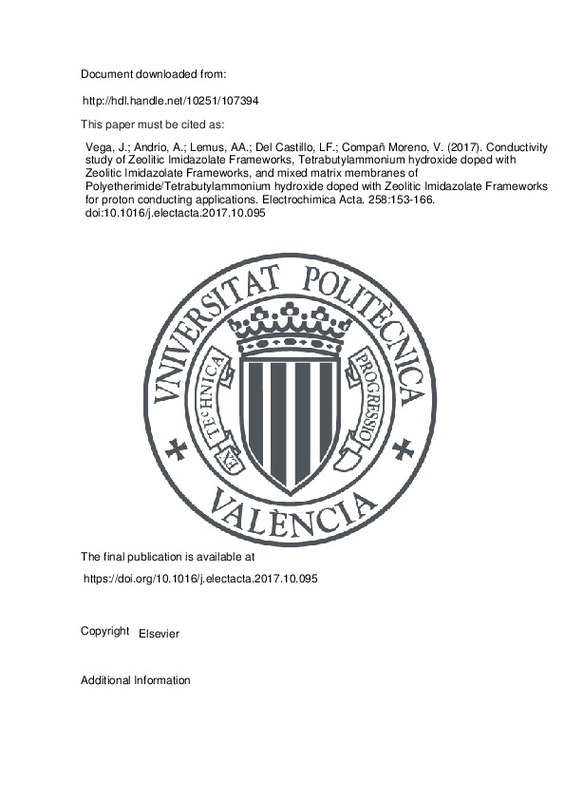

Conductivity study of Zeolitic Imidazolate Frameworks, Tetrabutylammonium hydroxide doped with Zeolitic Imidazolate Frameworks, and mixed matrix membranes of Polyetherimide/Tetrabutylammonium hydroxide doped with Zeolitic Imidazolate Frameworks for proton conducting applications
RiuNet: Repositorio Institucional de la Universidad Politécnica de Valencia
JavaScript is disabled for your browser. Some features of this site may not work without it.
Buscar en RiuNet
Listar
Mi cuenta
Estadísticas
Ayuda RiuNet
Admin. UPV
Conductivity study of Zeolitic Imidazolate Frameworks, Tetrabutylammonium hydroxide doped with Zeolitic Imidazolate Frameworks, and mixed matrix membranes of Polyetherimide/Tetrabutylammonium hydroxide doped with Zeolitic Imidazolate Frameworks for proton conducting applications
Mostrar el registro sencillo del ítem
Ficheros en el ítem
| dc.contributor.author | Vega, J.
|
es_ES |
| dc.contributor.author | Andrio, A.
|
es_ES |
| dc.contributor.author | Lemus, A. A.
|
es_ES |
| dc.contributor.author | del Castillo, L. F.
|
es_ES |
| dc.contributor.author | Compañ Moreno, Vicente
|
es_ES |
| dc.date.accessioned | 2018-09-17T07:31:15Z | |
| dc.date.available | 2018-09-17T07:31:15Z | |
| dc.date.issued | 2017 | es_ES |
| dc.identifier.issn | 0013-4686 | es_ES |
| dc.identifier.uri | http://hdl.handle.net/10251/107394 | |
| dc.description.abstract | [EN] ZIF-8 (Z8), ZIF-67 (Z67), and ZMix, a Zn/Co bimetallic zeolitic imidazolate framework (ZIF), were synthesized and doped with tetrabutylammonium hydroxide (ZIFsT). The obtained powders were used as fillers for polyetherimide (PEI) at a concentration of 20 wt %. The presence of the three ZIFsT in the polymeric matrix enhanced proton transport relative to that observed for PEI or ZIFs alone. The real and imaginary parts of the complex conductivity were obtained for each of the six materials, and the temperature and frequency dependence of the real part was analyzed. The results at different temperatures show that the dc-conductivity are about three orders of magnitude higher for the doped ZIFsT materials than for the PEI/ZIFsT membranes. In addition, the conductivity of the PEI/ZIFsT membranes increases five or six times when the temperature is changed from 25 °C to 55 °C. For these materials, the conductivity measurements have a linear dependency with frequency, which allowed for the creation of a master curve. It was also found that the PEI/ZMixT membrane activation energy is four times smaller than that of PEI/Z8T membranes and five times smaller than that of PEI/Z67T. Similarly, the real and imaginary parts of the complex dielectric constant were obtained, and the tan ¿ was evaluated. Using this value, the diffusion coefficient and the charge carrier density were obtained. A discussion of the proton transport mechanism through the membrane is given, and a comparison of this work with those on similar electrolyte membranes is included. | es_ES |
| dc.description.sponsorship | This research has been supported by the ENE/2015-69203-R project, granted by the Ministerio de Economia y Competitividad (MINECO), Spain, and grants from National Mexican Council for Science and Technology for the scholarships of Ph.D. No. 356825 and mixed scholarship 2015 - MZO2016-mobility in the foreigner granted to Jesus Vega Moreno registered scholarship holder number 256015. Thanks to the CONACYT Program for the fellowship at the Universidad Politecnica de Valencia (UPV) and Universitat Jaume I that PhD student Jesus Vega used to carry out the experimental studies of this work. DGAPA-PAPIIT IG-100315. | en_EN |
| dc.language | Inglés | es_ES |
| dc.publisher | Elsevier | es_ES |
| dc.relation.ispartof | Electrochimica Acta | es_ES |
| dc.rights | Reserva de todos los derechos | es_ES |
| dc.subject | Zeolitic Imidazolate Frameworks | es_ES |
| dc.subject | Mixed Matrix Membranes | es_ES |
| dc.subject | Conductivity | es_ES |
| dc.subject | PEI/ZIFsT membranes | es_ES |
| dc.subject.classification | MAQUINAS Y MOTORES TERMICOS | es_ES |
| dc.subject.classification | FISICA APLICADA | es_ES |
| dc.title | Conductivity study of Zeolitic Imidazolate Frameworks, Tetrabutylammonium hydroxide doped with Zeolitic Imidazolate Frameworks, and mixed matrix membranes of Polyetherimide/Tetrabutylammonium hydroxide doped with Zeolitic Imidazolate Frameworks for proton conducting applications | es_ES |
| dc.type | Artículo | es_ES |
| dc.identifier.doi | 10.1016/j.electacta.2017.10.095 | es_ES |
| dc.relation.projectID | info:eu-repo/grantAgreement/MINECO//ENE2015-69203-R/ES/DESARROLLO Y EVALUACION DE NUEVAS MEMBRANAS POLIMERICAS REFORZADAS CON NANOFIBRAS PARA SU APLICACION EN PILAS DE COMBUSTIBLE CON ELEVADA ESTABILIDAD TERMICA/ | es_ES |
| dc.rights.accessRights | Abierto | es_ES |
| dc.contributor.affiliation | Universitat Politècnica de València. Departamento de Termodinámica Aplicada - Departament de Termodinàmica Aplicada | es_ES |
| dc.description.bibliographicCitation | Vega, J.; Andrio, A.; Lemus, AA.; Del Castillo, LF.; Compañ Moreno, V. (2017). Conductivity study of Zeolitic Imidazolate Frameworks, Tetrabutylammonium hydroxide doped with Zeolitic Imidazolate Frameworks, and mixed matrix membranes of Polyetherimide/Tetrabutylammonium hydroxide doped with Zeolitic Imidazolate Frameworks for proton conducting applications. Electrochimica Acta. 258:153-166. https://doi.org/10.1016/j.electacta.2017.10.095 | es_ES |
| dc.description.accrualMethod | S | es_ES |
| dc.relation.publisherversion | https://doi.org/10.1016/j.electacta.2017.10.095 | es_ES |
| dc.description.upvformatpinicio | 153 | es_ES |
| dc.description.upvformatpfin | 166 | es_ES |
| dc.type.version | info:eu-repo/semantics/publishedVersion | es_ES |
| dc.description.volume | 258 | es_ES |
| dc.relation.pasarela | S\351360 | es_ES |
| dc.contributor.funder | Ministerio de Economía, Industria y Competitividad | es_ES |






![[Cerrado]](/themes/UPV/images/candado.png)

